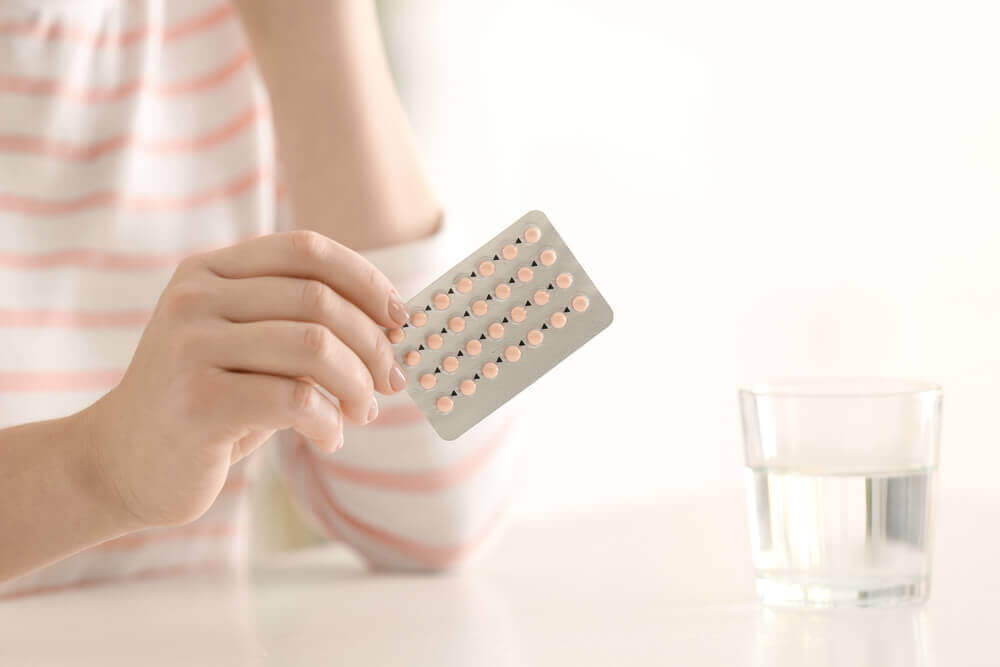What Happens if I Vomit After Taking My Birth Control Pill?


Written and verified by the doctor Leonardo Biolatto
The birth control pill is a simple and easy way to prevent pregnancy and, when used properly, it’s 98-99% effective. Though taking the pill correctly isn’t difficult, you should know its effectiveness is dependent on routine. In other words, you should take your pill at the same time every day.
However, maybe you forgot to take your pill one day or you’re sick and your doctor prescribed you a round of antibiotics. Have you ever wondered what happens if you vomit immediately after taking your birth control pill? Why does it happen? What can you do? We’ll help you answer these questions below.
How birth control pills work
Birth control, or oral contraceptives, is a medication with man-made hormones capable of regulating a woman’s menstrual cycle and preventing pregnancy. Some brands contain only the hormone progestin, while others contain both progestin and estrogen. These are called combination pills.
Since the birth control pill first hit the market until now, levels of hormone concentrations have decreased while improving their effectiveness.

Replicating the menstrual cycle
Birth control pills try to replicate the body’s natural menstrual cycle. On average, a woman’s cycle ranges from 21 to 28 days. Because of this, almost all brands offer either 21-day or 28-day options. Take a look at the differences:
- 21-day packs have 21 active pills and no inactive pills. In other words, you take one pill for three weeks, then rest for one week. The following week, you will begin a new pack of pills.
- 28-day packs have 21 active pills and 7 inactive pills. This means you will take a pill every day and start a new pack immediately after you finish the first.
With either option, your period should occur during the last 7 days of your cycle.
That’s to say, if you take a 21-day contraceptive, you will get your period during the rest week. On the other hand, if you take the 28-day contraceptive, you will get your period during the inactive week.
It’s very important to take the pill at the same time every day so they are more effective in regulating your period and suppressing ovulation. When it does this, your body doesn’t release an egg.
When there’s no egg to be fertilized, pregnancy can’t occur. Therefore, it’s critical to take your pill regularly to ensure it works as it should.
Read more: What You Should Know About the Birth Control Shot
Side-effects of the birth control pills
Beyond safety and efficiency, oral contraceptives can cause adverse effects in some women. Even though they aren’t typically serious, it’s important to know what they are:
- Headaches: Women with a history of migraines before starting birth control might experience headaches associated with the pill.
- Mood swings: Changes in mood are linked to the hormonal cycle and aren’t dangerous.
- Breast sensitivity: Many women have reported tenderness in their breasts due to the hormones in birth control pills.
- Weight gain: Some women experience weight gain when starting a new birth control method due to hormonal changes. It’s likely that your weight will regulate as your body gets used to the hormones.
- Nausea and vomiting: Mild stomach sensitivity has also been reported by some women when starting the pill. This should also go away as your body adjusts to the hormones.
Discover: Should I Stop Using Contraceptives?
What should I do if I vomit after taking the pill?

Studies show that regardless of the reason, vomiting after taking oral contraceptives can indeed alter its effectiveness. However, it’s different if vomiting occurs right after taking the pill or later on during the day, hours after ingesting it.
It’s important to note that throwing up your pill 3-4 hours after you took it has the highest probability of altering its effectiveness. This is because it takes about this much time to digest the pill and activate the hormones.
Vomiting during this time period likely means the body was not able to completely absorb the contraceptive hormones. In this case, we recommend taking another pill and, in the following days, continue taking your pill at the same time as every day.
This way, if you only threw up once and took another pill, you would be able to maintain the pill’s effectiveness and continue regulating your cycle. Because of this, it would be wise to always have a backup pill pack just in case you vomit after taking your pill or something happens to your other pack. You should respect your 21- or 28-day routine as much as possible.
Additionally, you could get sick more than once over a length of time due to food poisoning or the flu. When prolonged illness occurs, when taking certain antibiotics, or if you forget to take your pill on time, you must use another form of contraception like a male condom or female condom to prevent pregnancy.
Finally, it’s important to talk with your doctor if you experience any of the above situations or if you have any questions about your birth control pill.
All cited sources were thoroughly reviewed by our team to ensure their quality, reliability, currency, and validity. The bibliography of this article was considered reliable and of academic or scientific accuracy.
- World Health Organization : Medical eligibility criteria for contraceptive use Fifth edition 2015
- Petitti DB. Clinical practice. Combination estrogen-progestin oral contraceptives. N Engl J Med 2003; 349:1443.
- WHO (2004). «Low-dose combined oral contraceptives». Medical Eligibility Criteria for Contraceptive Use (3rd edición). Geneva: Reproductive Health and Research, WHO.
- Curtis KM, Tepper NK, Jatlaoui TC, et al. U.S. Medical Eligibility Criteria for Contraceptive Use, 2016. MMWR Recomm Rep 2016; 65:1.
- Hall, KS, White, KO, Reame, N. y Westhoff, C. (2010). Estudio del uso de la anticoncepción oral: una revisión de los enfoques de medición. Revista de salud de la mujer (2002) , 19 (12), 2203–2210. https://doi.org/10.1089/jwh.2010.1963
- IT. del Sistema Nacional de Salud. Volumen 35, Nº 3/2011. Actualización en anticonceptivo hormonal.
- Soledad Díaz, Verónica Schiappacasse. (2017). ¿Qué y cuáles son los métodos anticonceptivos? Instituto Chileno de Medicina Reproductiva. http://www.icmer.org/documentos/anticoncepcion/Que%20y%20cuales%20son%20los%20metodos%20anticonceptivos%2001122017.pdf
This text is provided for informational purposes only and does not replace consultation with a professional. If in doubt, consult your specialist.








